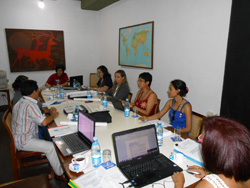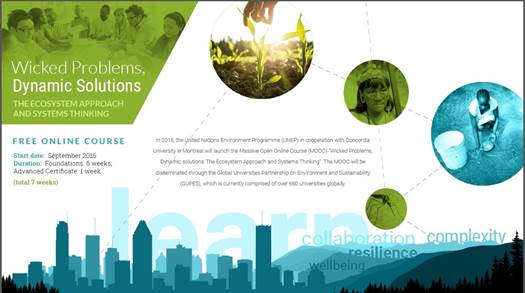 |
Programa de las Naciones Unidas para el Medio Ambiente Oficina Regional para América Latina y el Caribe |
Loading
|
| Red de Formación Ambiental para América Latina y el Caribe | ||||
 |
|Formación La Oficina Regional para América Latina y el Caribe (ORPALC) situada en Ciudad de Panamá trabaja muy de cerca con los 33 países de la región - entre ellos 16 pequeños Estados insulares en desarrollo- con una población de cerca de 588 millones de habitantes. El PNUMA contribuye con el refuerzo de las capacidades de los países de la región, incorporando el elemento de formación en todas sus áreas prioritarias, promoviendo y realizando actividades de formación en América Latina y el Caribe. Las actividades de formación van dirigidas a funcionarios de gobiernos, academia y comunidades locales, entre otros. A modo informativo, el documento anexo presenta un resumen de las actividades de capacitación en las distintas seis áreas prioritarias del PNUMA (2011 – 2013) que son llevadas a cabo por programas distintos al de la Red de Formación Ambiental. |
|||
Massive Open Online Course: "The Ecosystem Approach and Systems Thinking" starting on 12 September 2016 The UNEP in partnership with Concordia University, KnowledgeOne and EcoHealth Alliance will be offering the above referenced Massive Open Online course from 12 September - 23 October 2016. The free MOOC will help you gain:
Cursos internacionales cortos PNUMA/UNESCO/Universidad Técnica de Dresden (Alemania), 2016-2017:
En apoyo de los objetivos de desarrollo sostenible, los cursos están diseñados para preparar a los participantes en tareas relacionadas con la planificación, coordinación y gestión ambiental en los ministerios, los organismos y los gobiernos locales, así como las organizaciones no gubernamentales de sus países de origen. Se espera que los participantes tengan varios años de experiencia profesional relevante en el tema del curso al cual aplican y ser propuestos por la institución de un país en desarrollo o emergente. Fecha máxima de aplicación: 09 de junio de 2016 Preguntas frequentes: https://tu-dresden.de/cipsem/future_courses/faqsUNEP). Call for applications 2016-2018 The MESPOM Consortium of six universities – Lund University (Sweden), the University of Manchester (UK), Central European University (Hungary), the University of the Aegean (Greece), the Middlebury Institute of International Studies at Monterey (USA), and the University of Saskatchewan (Canada) – invites applications for the Masters course in Environmental Sciences, Policy and Management (MESPOM) for 2016-2018. The two-year Masters programme enables students and early career environmental professionals to respond to complex environmental challenges, especially in an international context. The programme offers interdisciplinary modules delivered by experts of environmental science, policy and management. This includes courses such as ‘Sustainable Development and Global Transition: from Paradigm to Practice’ and ‘Environmental Governance: Advanced Topics’, which provide students with an in-depth understanding of sustainable development strategies and the post-2015 sustainable development agenda. More information can be found on the MESPOM website or by writing to the MESPOM Consortium Coordinator. |
||||
| _____________________________________________________________________________________________________________________________________ | ||||
UNEP Environmental Training Compedium
|Cursos
|
||||
| Copyright © Programa de las Naciones Unidas para el Medio Ambiente | Aviso legal | Contacto | Intranet de PNUMA | Sigue al PNUMA en |
